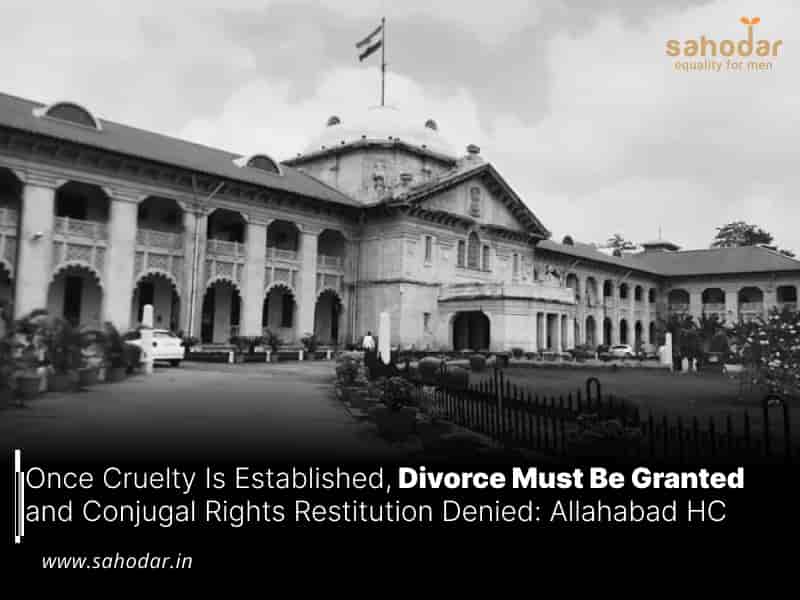The Allahabad High Court ruled that upon the establishment of cruelty, a decree for divorce must be issued, and the suit for restitution of conjugal rights must be dismissed.
This observation was made by the Lucknow Bench in a series of appeals filed under Section 19(1) of the Family Courts Act, 1984, read in conjunction with Section 28 of the Hindu Marriage Act, 1955 (HMA). The appeals were lodged by the husband challenging the Family Court’s judgment, which dismissed his suit for the dissolution of marriage and decreed the wife’s suit for restitution of conjugal rights in her favor.
A Division Bench comprising Justice Rajan Roy and Justice Om Prakash Shukla held, “… we have no hesitation in determining that once cruelty was proved, the suit for divorce had to be decreed and the suit of the wife had to be dismissed, subject of course to the provision of Section 13A of Act, 1955, but, the Family Court has erred on facts and law in not doing so. The point of determination is answered accordingly.”
Advocate Rohit Tripathi appeared for the appellant, while Advocate D.P. Singh Somvanshi represented the respondent.
Facts of the Case:
The appellant, the husband, and the respondent, the wife, were married in 1986 and had two sons from their union. The appellant alleged that after the birth of their sons, the respondent ceased to show any interest in him and began to exhibit misconduct towards him in the presence of servants and family members. It was further alleged that the respondent once locked the appellant in the toilet, accused him of having an illicit relationship with a neighbor, abused his parents, and eventually stopped providing him with food.
Since 2003, the parties have been living separately under the same roof. Consequently, the appellant instituted a suit under Section 13 of the Hindu Marriage Act (HMA) seeking a decree of nullity of marriage. In response, the respondent filed multiple cases against the appellant under the Domestic Violence Act, Section 125 of the Criminal Procedure Code (CrPC), Sections 498A, 323, 504, 506, and 406 of the Indian Penal Code (IPC), and the Dowry Prohibition Act. The respondent also instituted a suit for restitution of conjugal rights. The Family Court decreed the suit in favor of the respondent, prompting the appellant to seek relief from the High Court.
The High Court in the above context of the case noted, “It is apparent that Section 13 of the Act, 1955 provides for grant of divorce and enumerates various grounds on which the same may be granted. It enacts that “any marriage solemnized whether before or after the commencement of this Act’ may be dissolved on petition presented either by the husband or by the wife or any of the grounds specified therein. Clause (i-a) of sub section (1) of section 13 of the Act, 1955 declares that a decree of divorce may be based by a court on the ground that after solemnization of marriage, the opposite party has treated the petitioner with cruelty subject to the State amendments to Section 13 (1) (i-a) in this regard. There are other grounds also mentioned in the said sub section (i) of section 13 of Hindu Marriage Act and each of these grounds are independent of each other.”
The Court noted that each ground is mutually exclusive, as indicated by the use of the disjunctive ‘or’ to separate them. There is no basis to interpret ‘or’ conjunctively, as this would lead to absurdity. Therefore, cruelty alone can be a sufficient ground for the dissolution of marriage.
“However, it seems that learned Family Court, after returning a finding that “cruelty” has been inflicted by the respondent-wife on the appellant-husband, refused to grant divorce to the husband presumably on the ground that the ground of “desertion” could not be proved by the appellant-husband”, it said.
Additionally, the Court observed that instead of granting the suit for divorce, the Family Court decreed the respondent’s suit for restitution of conjugal rights, which is incongruous and irreconcilable with the finding of cruelty in the context of the divorce suit in favor of the appellant/husband. The Court stated that this finding constituted a valid ground and reasonable cause under Section 9 of the HMA for the husband to not live with the wife and for the Family Court to dismiss the wife’s suit under Section 9 of the HMA. However, this significant aspect was not considered.
“… it is not a fit case for grant of alternative relief of judicial separation under Section 13A of the Act, 1955. … The marriage between the appellant and respondent is dissolved. Liberty is granted to the respondent to initiate separate proceedings under Section 25 of the Act, 1955 as per law”, it concluded.
Consequently, the High Court allowed the appeals and overturned the impugned judgment and decree.

